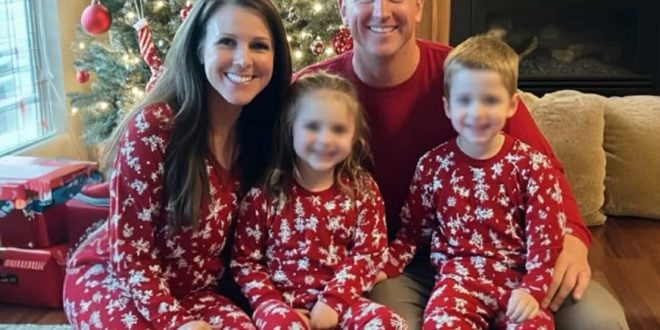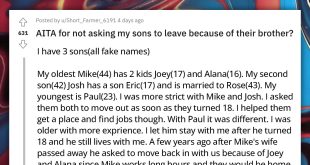I can still recall the day everything came crashing down so clearly that even after all these years, it feels like I’m looking at a collection of snapshots from that moment.
Fourteen years of marriage—fourteen years spent creating a life together, raising kids, celebrating holidays, handling home repairs, and supporting one another through tough times—disappeared in a heartbeat. It all unfolded in an instant, yet with such clarity, it felt like witnessing the destruction of a fragile tapestry being pulled from the wall, the threads fraying and breaking, leaving behind a rough silhouette of something once exquisite.
The sun was beginning to set, and I found myself in the kitchen, getting dinner ready. The delightful scent of sautéed onions and rosemary wafted through the home. The kids were occupied in their rooms—one focused on homework while the other played quietly. The radio hummed gently in the background, filling the room with classical melodies that I had come to love in my new role as a stay-at-home mom, a stark contrast to my years spent in the corporate hustle. It was just another typical day, or at least that’s what I believed.
Suddenly, I heard the distinct sound of heels clicking on the hardwood floor in our hallway. It felt completely out of place. I stopped for a moment, feeling uncertain about what to make of it. We didn’t have any visitors planned, and Stan, my husband, rarely brought anyone home without giving me a heads-up. And there they were: footsteps that were sharp and filled with confidence. My heart raced a bit, and I switched off the burner, wiping my hands on my apron as I made my way out of the kitchen.
I came across them in the living room: Stan and a woman I didn’t recognize. She stood tall, dressed impeccably, and moved with a certain aloof grace that I found instantly unappealing. She looked at me with a cool detachment, lacking any hint of kindness or curiosity, just a sense of haughty indifference. She then looked at Stan and remarked, “Well, darling, you were right; she really has let herself go.” “Nice bone structure, though.” Her voice was smooth and carried a hint of dismissal.
My husband stood next to her, deliberately not meeting my gaze. My cheeks flushed with heat, a blend of humiliation and confusion swirling inside me, accompanied by a sharp surge of anger. Am I really going to let myself go? I glanced at my outfit: just a plain blouse and some cozy trousers. Perhaps my hair wasn’t styled just right, and maybe I had gained a few pounds since we first got married, but I had been devoted to taking care of our children, especially after leaving my good marketing job to focus on our autistic daughter’s needs. The sacrifice wasn’t driven by vanity; it stemmed from love and a sense of duty.
“Stan,” I said, my voice wavering a bit, “who is this woman who believes she can speak about me like that in my own home?”“I attempted to sound resolute, but shock and hurt overwhelmed me, leaving my legs unsteady.”
He didn’t respond to me directly. He stepped forward just a bit and said something that would change my life forever: “Not your house any longer.” “I want a divorce, and I want you out of here.” His voice was devoid of emotion, so indifferent, as if we were merely discussing moving furniture around rather than breaking apart a family.
In that instant, my world didn’t just shift; it spiraled wildly beyond my grasp. This house has always been a refuge for our family. I had walked away from a career that brought me joy and fulfillment—one that made me feel valued and alive—because we both decided our daughter required more focused care at home. We had discussed it thoroughly. We made that decision together. At least, that’s what I thought. In my living room stood this stranger, her gaze dripping with condescension, while Stan, my partner of fourteen years and the father of my children, was nonchalantly tossing aside everything we had built together.
Finding the right words was a challenge for me. “You’re saying goodbye to your family… For her?“I managed,” I said, my voice trembling. I glanced down the hallway, where our kids were happily oblivious to everything around them. What’s the best way to explain this to them?
He skipped the explanation altogether. He just said he wanted me out of his life. In that moment, it felt like our love held no significance for him at all. The years spent compromising, facing challenges together, and comforting each other in the dark when our daughter’s diagnosis felt like too much—are now behind us. He had given us all up for this relationship, for a woman who regarded me as if I were just an old, tired piece of furniture.
I had no other option but to gather my belongings. I can still recall the way my movements felt so robotic as I folded clothes and packed them into suitcases. The children looked bewildered, tears welling up in their innocent eyes as I attempted to explain that we would be leaving. I struggled to find the right words to express that their father had taken a different direction. I simply assured them that I would look after them, that everything would be alright. In those hours, my heart shattered repeatedly, yet I pressed on, resolute in my desire to protect them from the depths of this betrayal.
We settled into a small apartment. The space felt tight, and there were spots where the paint was flaking off. The windows shook as the wind gained strength, and the kitchen was just small enough that I could barely turn around. Yet, it belonged to us—a fresh beginning. Initially, Stan transferred some money. He felt he owed that much, I guess, and perhaps a small part of him sensed a sense of responsibility. However, over time, the payments became less frequent and eventually ceased completely. He cut off all ties with the children, never reaching out, never stopping by, as if he believed he could make them disappear from his life simply by pretending they didn’t exist.
I landed two jobs—one as a part-time cashier at a supermarket and the other cleaning offices in the evenings. I never thought my life would turn out like this—cleaning floors and scanning groceries, managing therapy sessions for my daughter, assisting my older child with their homework, and making every dollar count. During that time, I discovered something really important: I was much stronger than I had ever thought possible. Deep within me, there was a well of strength I had never needed to draw from before. Every day presented its own set of challenges, but it also showed me just how much I could withstand and triumph over.
I’ve built a strong connection with my kids. In Stan’s absence, our little apartment felt authentic and brimming with real love. We may not have enjoyed lavish outings or fancy vacations, but we found joy in laughter on the good days, shared comforting hugs on the tough ones, and embraced a routine that kept us grounded. My daughter really thrived on consistency, and I started to see her make small strides. My other child discovered the importance of responsibility and compassion. They witnessed my dedication and relentless effort, and I truly hope it imparted a lesson on perseverance to them.
Three years went by. For three years, I’ve been taking one step after another, occasionally finding myself in tears on my pillow from sheer exhaustion, and at other times, celebrating the little victories with a smile. I’ve realized that I’m not dwelling on Stan’s betrayal every single day anymore. The passage of time and the challenges faced had softened that ache. I focused on what lies ahead for me and my kids. I thought about enrolling in some online courses to gradually refresh my old skills. Perhaps someday, when everything settles down a bit more, I might be able to find a slightly larger home. The possibilities lingered, subtle yet undeniable.
One afternoon, I unexpectedly bumped into Stan and his new wife. On my Sunday off, I decided to treat myself to a visit at a quaint little coffee shop in a lovely part of town. It felt like a special indulgence, something I don’t often do. I savored a latte in peace, casually flipping through a magazine that someone had abandoned on a nearby chair. That’s when I noticed them. I wasn’t quite certain at first—it had been so many years. But yes, it was definitely Stan, appearing older and more weathered. His new wife, the one he picked instead of us? She was there as well, but now her elegance felt a bit strained, her clothes looked somewhat outdated, and her posture lacked its usual confidence.
A peculiar rush of feelings washed over me. Frustration, pain, compassion, intrigue. They spotted me nearly simultaneously. Stan’s gaze met mine, and I noticed a fleeting expression of panic or regret cross his features. He really got up, stepped away from his wife, and hurried over to me. I stood there, speechless, as he came closer, his head tilted down just a bit. He started to talk rapidly, his words spilling out as he expressed his desire to see the children again and how much he missed them. It felt like he thought that his sudden remorse could erase all those years of being away and not caring.
I sat there in silence, allowing him to share his thoughts. He admitted he had erred, coming to understand that family truly meant everything. He requested that I allow him to rejoin their lives again. It was clear that time had taken its toll on him. Perhaps the guilt was heavy on his shoulders, or maybe his new marriage had taken a turn for the worse. Maybe he realized that betrayal and shallow decisions don’t bring true happiness. But I had to consider my children. They had grown older, now more conscious of what had transpired. They understood that their father had left and never reached out. They had developed their own views about him.
I paused for a moment, taking a deep breath before I replied. “I can’t decide that,” I said. “They can choose for themselves whether they want to see you.” I’ll let them know you asked, but I won’t push them into anything.” My voice was steady, not harsh, but resolute. I needed him to realize that he no longer had any control or influence over our lives. He couldn’t simply snap his fingers and take back his role as a father.
His wife noticed us from across the café’s patio and rushed over, launching into an argument with him as soon as she got there. She wanted to understand why he was speaking to me and what his intentions were. I observed them argue, remembering the first time I encountered her—how poised and confident she had appeared. At that moment, her voice was sharp, and she stood with a protective posture. I came to understand that what they had once shared had probably become toxic over time. They appeared worn out, both of them, caught in a reality they had picked for themselves.
I remained silent after that. I really didn’t have to. I stepped out of the coffee shop and started to walk away. As I walked along the street, a feeling of satisfaction washed over me—not from seeking revenge, but from the realization that I had transcended the hurt he caused. While my life may not have regained the comfort and security it once knew, I’ve created a new reality that feels genuine and steady. I had become strong; I had discovered independence. I realized that my identity wasn’t defined by being a wife or by meeting someone else’s expectations. I took back control of my life and built a future that my children and I could count on.
As I strolled back to my apartment, I couldn’t help but reflect on how much things had changed from what I had once envisioned. When I married Stan, I thought we would grow old together, travel after the kids were grown, and savor the rewards of our hard work as a team. I ended up starting over and completely reshaping my life. In that process of reinvention, I discovered my true self. I was free from the need to fake happiness just to keep up appearances, and I no longer had to endure the watchful eye of someone who didn’t value me. I noticed just how much lighter I felt when I let go of his expectations.
At home, I shared with my kids that I had bumped into their dad. I noticed a variety of responses: some people were curious, others seemed a little sad, and a few didn’t seem to care much at all. They had transformed from the small, scared kids I once encouraged to step outside their home. They had grown, matured, and understood more than I often realized. I told them that their father wanted to see them again, but ultimately, the choice was up to them. A child mentioned that they needed some time to think. The other just shrugged, saying they really didn’t care all that much. I honored their independence. They had every right to decide if they wanted him back in their lives.
As the days stretched into weeks, none of the children reached out to him. They were always on the go, juggling school, friends, and their favorite hobbies. We created new traditions—Sunday movie nights at home, homemade pizza parties, and quick weekend trips to the local park. The new rituals, though modest, had taken the place of the old ones. I came to understand that we were really happy, that our home, despite being small and modest, was brimming with authentic love and warmth. Stan’s absence was no longer a deep ache; it had simply turned into a part of everyday life.
Sometimes, I found myself pondering what might change if he put in more effort, if he reached out with letters or came knocking at our door. Am I willing to let him back in? Maybe under certain conditions. However, I refused to allow him to disturb the tranquility and balance I had worked so hard to create. Above all, I wouldn’t allow him to harm the children again. Rebuilding trust requires more than just a chance meeting at a coffee shop and some heartfelt apologies.
The way his wife acted at the café really lingered in my thoughts. His conversation with me clearly shook her, which only strengthened my belief that their relationship wasn’t as ideal as it seemed. The idea that they probably weren’t happy together didn’t bring me any joy. It seemed more like a warning: every choice we make comes with its own set of consequences. He decided to leave his family behind in search of what he thought would be a better life. Instead, he stumbled upon something that felt less rewarding, something that gradually drained his energy over time.
I didn’t see any reason to share this experience with my friends or family. Everyone who was important already knew what Stan had done. They stood by me during the tough times, helped me regain my footing, shared encouraging words, and at times, even provided financial assistance. I felt no need to boast about my newfound sense of empowerment. The sense of satisfaction I experienced was subtle and intimate—proof that I had endured a tragedy and emerged stronger than ever.
I thought about what forgiveness really means. It’s a bit complicated. True forgiveness doesn’t mean erasing the past or acting like the pain never happened. It’s about letting go of the anger and resentment that can slowly consume you from the inside. Did I forgive Stan? Maybe not entirely. The memory of that night, when he stood next to her and said he wanted me out of the picture, is forever burned into my mind. But I had released the persistent anger. I had given myself permission to move forward. That was a unique form of forgiveness: letting go of my own shortcomings for not anticipating it, for placing my trust in someone who ultimately let me down, and granting myself the liberty to live without holding onto resentment.
Throughout the next year, I kept observing my children blossom into truly remarkable young individuals. They showed kindness, compassion, and resourcefulness. The challenges we faced also taught them a sense of strength. When questions about their father occasionally arose, I aimed to be honest while avoiding any unnecessary bitterness. I explained that he had made some bad decisions and had strayed from his path, but I believe people can change and discover their own ways in time. If they ever felt the need to reach out to him, I wouldn’t get in their way. However, I wouldn’t want to put any pressure on them. This was their decision to make.
I never got a follow-up call or letter from Stan after his attempt to reconnect. Perhaps he came to understand the seriousness of what he had done only after it was too late, or maybe he felt too embarrassed to confront the children he left behind. If he ever mustered the courage to give it another shot, he would discover a family that had moved on in his absence. He realized that his place was gone in a home that used to belong to him, now filled with resilience and self-reliance.
Reflecting on it now, I realize that the moment he introduced that woman into our lives and made me feel small was the moment he liberated us both—liberated us from the illusion of a marriage that wasn’t as strong as I had thought. It helped me uncover the true depth of my strength, to create a life from the remnants he left, and to lead my children into adulthood with honesty, love, and dignity. I didn’t need his validation or support anymore. I had discovered my own path, on my own terms.
That night marked the end of fourteen years of marriage, but it also opened the door to a whole new chapter in life. In that chapter, I discovered that family isn’t about living in a big, fancy house; it’s about the people who stand by you with love and dedication, especially during tough times. My children and I faced that storm together, and we came out into a quieter time where we could share laughter at the dinner table, support each other’s dreams, and recognize the delicate nature of human promises. We came to realize that trust is something you have to earn, that love needs to be cared for, and that self-respect can lead you through even the darkest times.
Ultimately, the sense of fulfillment I experienced as I left that coffee shop wasn’t rooted in revenge or any sense of pleasure from someone else’s misfortune. I realized that I didn’t have to define my value based on Stan’s expectations anymore. He picked his direction, and I picked mine. My journey brought me to a place of clarity and authenticity, where I could stand tall, proud of the fact that I had reconstructed everything he attempted to destroy. And that, above all else, brought me a sense of calm.
Summarized:
The author reflects on the moment when her marriage to Stan, the father of her children, shattered in an instant. After fourteen years of marriage, the couple had created a life filled with shared experiences, from raising their children to celebrating holidays and handling home repairs together. But everything took a turn when Stan walked in with a woman she had never encountered before. The woman stood tall, dressed impeccably, and moved with a certain elegance that felt a bit distant and unapproachable. She looked at her with a detached air, lacking any warmth or interest, as if she were simply too above it all to care.
The author’s husband stood beside her, deliberately looking away from her gaze. She experienced a mix of humiliation, confusion, and anger as she surrendered to her emotions. She glanced at her outfit, pondering the themes of love and responsibility. Stan, who had been looking after their daughter’s needs, made the difficult decision to leave the family home and pursue a divorce. He stepped forward slightly and uttered words that would alter her life forever: “Not your house any longer.” <text”I need a divorce, and I want you to leave.” His tone was incredibly flat and dismissive, as if they were discussing something trivial like rearranging furniture rather than the serious matter of dismantling a family.
The author found it difficult to articulate her choice to leave her family for her. Stan skipped the explanation altogether. He just said he wanted me out of the picture. In that moment, it felt like our love held no significance for him at all. The years spent compromising, facing challenges together, and comforting each other in the darkness when their daughter’s diagnosis felt too heavy—now just a memory. He had given us all up for this relationship, for a woman who regarded me as if I were just an old, tired piece of furniture.
Left with no other option, she gathered her belongings and carefully packed them into suitcases. The children looked bewildered, tears welling up in their innocent eyes as she attempted to explain that they would be leaving. She struggled to find the right words to express that their father had taken a different direction. She simply assured them that she would look after them and that everything would be alright. Her heart shattered repeatedly during those hours, yet she pressed on, resolute in her mission to protect them from the depths of this betrayal.
They settled into a small apartment, tight on space, with the paint flaking in spots. Stan sent money at first, and perhaps a small part of him felt a sense of responsibility. However, over time, the payments became less frequent and eventually came to a complete halt. He cut off all ties with the children, never reaching out or stopping by, as if he believed he could make them disappear from his life simply by pretending they didn’t exist.
The writer shares their experience working as a part-time cashier at a supermarket during the day and taking on cleaning jobs in the evenings. They never thought they would end up working full-time, balancing therapy appointments for their daughter, assisting their older child with homework, and making every dollar count. They discovered that they were much stronger than they had ever thought possible. Each day presented a challenge, but it also served as proof of their ability to endure and triumph over obstacles.
The children and the author shared a close connection, and in Stan’s absence, their cozy apartment radiated with sincerity and true affection. On the good days, they shared laughter, while on the tough ones, they offered each other comforting hugs, creating a routine that brought them stability. Their daughter thrived on consistency, while their other child discovered the importance of responsibility and compassion. They observed the author putting in relentless effort, never backing down, and they hope it imparted a lesson on perseverance.
Three years went by, and the author realized she wasn’t dwelling on Stan’s betrayal every single day anymore. Over time, the intensity of that pain had faded, and she thought about enrolling in some online courses to gradually reconnect with her previous skills. She considered the idea of moving into a slightly larger space once things settled down a bit more.
One afternoon, the author unexpectedly bumped into Stan and his new wife. They saw her and saw him, appearing older and more worn than before. Stan asked the author if he could be part of their lives again, but the author was taken aback to realize that time had not treated him well. He came to understand that family meant everything, recognizing his mistake and realizing he could no longer exert any influence over their lives.
The author’s wife rushed in and started to argue with him as soon as she got there. She insisted on understanding why he was speaking to her and what his intentions were. The author came to understand that what they once had might have turned toxic over time, and they appeared weary, caught in a reality of their own making.
The author remained silent, stepping out of the coffee shop and strolling away. As she walked along the street, a feeling of satisfaction washed over her, not from seeking revenge but from the realization that she had transcended the hurt he had caused. Though her life may not have regained the comfort and security it once knew, she had crafted a new reality that was genuine and steady. She had become strong, embraced her independence, and realized that her identity wasn’t defined by being a wife or meeting anyone else’s expectations.
As she strolled back to her apartment, she reflected on how much things had changed from what she had once envisioned. When she married Stan, she thought they would grow old side by side, travel once the kids were independent, and savor the rewards of their hard work together. Instead, she discovered a sense of authenticity in her reinvention, and she recognized how much lighter she felt without the weight of his expectations.
The writer shares her journey through a challenging relationship with her children, particularly with Stan and his wife. After years apart, Stan longed to reunite with them, but ultimately, the choice was in their hands. The author honored their independence and gave them the option to decide if they wanted him back in their lives. As time went by, the kids created new traditions, like cozy Sunday movie nights at home, fun homemade pizza parties, and quick weekend outings to the nearby park. A little shift in their daily routine brought a wave of happiness and a refreshing sense of stability to their home life.
The author thought about whether Stan could put in more effort to reconnect with the kids, but she was willing to consider it, provided certain conditions were met. She refused to allow him to disturb the harmony and security they had built, and above all, she wouldn’t let him harm the children once more. The author didn’t feel the urge to share this encounter with friends or family, since everyone important already knew what Stan had done. They stood by her during the tough times, helped her regain her footing, offered comforting words, and occasionally provided financial assistance.
The author contemplated the idea of forgiveness, emphasizing how it involves liberating oneself from the anger and resentment that can gnaw at the soul. She had let go of her resentment towards Stan for not anticipating the betrayal, for placing her trust in someone unworthy, and for choosing to embrace life without holding onto bitterness. Throughout the year, the author observed her children blossoming into extraordinary young people, and the challenges they faced instilled in them a deep sense of resilience. When asked about their father’s efforts to reconnect, the author aimed to be honest while avoiding any harshness. She explained that he had made some bad choices and had lost his direction, but it’s important to remember that people can change and discover their own paths in unique ways. If they ever felt the need to reach out to Stan, she wouldn’t interfere, but she also wouldn’t push them to do so.
The author realized that the moment Stan brought that woman into their home and put her down was the moment he liberated them both. It helped her uncover the true extent of her strength, create a new life from the remnants he left, and lead her children into adulthood with honesty, love, and dignity. She had moved beyond the need for his validation or support, discovering her own strength and independence.
That night marked the end of fourteen years of marriage, but it also opened the door to a whole new chapter in life. In that chapter, the author discovered that family isn’t about living in a big, fancy house; it’s about the people who stand by you with love and dedication during tough times. The children and the author stepped into a more peaceful time, where they could share laughter over dinner, nurture each other’s dreams, and recognize the delicate nature of human promises. They realized that trust is something you have to build, love needs care to flourish, and self-respect can light your way even in the darkest times.
Ultimately, the sense of fulfillment she experienced as she left that coffee shop wasn’t rooted in revenge or a sense of pleasure at someone else’s misfortune. Instead, it stemmed from the realization that she no longer had to gauge her value according to Stan’s expectations.
Feel free to SHARE this article with your FAMILY and FRIENDS on Facebook!
 Viral Hatch US/UK No.1 News Portal
Viral Hatch US/UK No.1 News Portal







